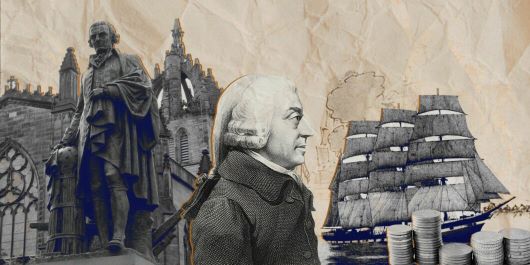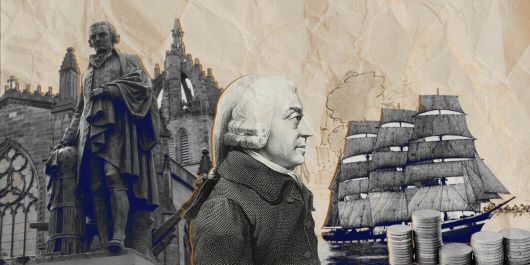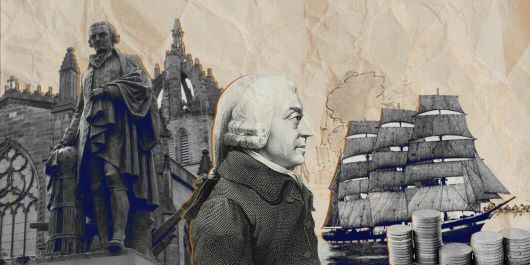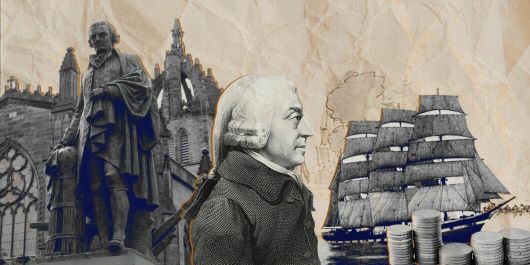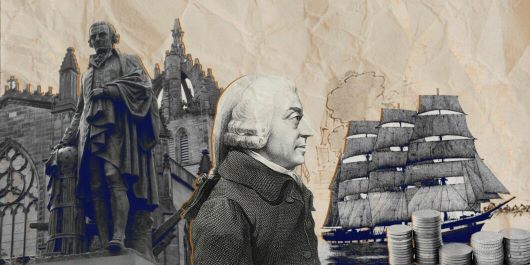This year we celebrate the tercentenary of
Adam Smith’s birth. As fits a thinker of his complexity and importance, we are still finding new ideas in Smith’s work to inspire our own thinking. In his essay, Vernon Smith presents one such under-explored idea in Smith’s work—property and its connection to justice, rights, and economic development. V. Smith argues: “It does not seem to be widely known or appreciated, outside of academic specialties, that in his first published book,
The Theory of Moral Sentiments (1759, TMS) Smith derives a coherent fundamental theory of justice as property relevant for all societies, down to the present, and a precondition for this economic development. This theme is further informed by class notes taken by two of his students and published over two centuries later in
Lectures on Jurisprudence (1978; LJ).
In agreement with Vernon Smith’s thesis, I argue that Smith’s notions of justice, property, and injury require judgment and induce citizens to have an emotional attachment to the law via their sympathy with each other. Much of my response will build on important ideas V. Smith raises in Smith’s work, especially the role of resentment in justice and his ideas on jurisprudence. I will also raise questions about V. Smith’s thesis, especially about justice as property, justice as negative, and the role of government. I will first discuss the theme of property, then I will move to considerations of justice and violence, and finally I will reflect on the role of government, specifically in the American case.
Property
First I want to discuss the important interpretation of property V. Smith gives us in Smith’s work. V. Smith argues, “The immediate consequence of Justice as security from injury is property.” He additionally explains that for Smith we have property in our bodies, “the products of [our] body and mind, and property in our promises.”
We have, as I see it, two ways of understanding
property rights in the history of political economic thought and the liberal tradition. First is the idea that property is an inviolable right based on our humanity. This view is best described by
John Locke in his
Second Treatise on Government (1689). For Locke, property is an extension of our right to our person. We extend our right to our person to material objects by laboring on them, and society gets a secondary benefit because our labor improves these material items that would in many cases otherwise go to waste. Locke describes this process saying, “Whatsoever, then, he removes out of the state that nature hath provided and left it in, he hath mixed his labor with, and joined to it something that is his own, and thereby makes it his property” (Paragraph 27). Locke then explains how injustice can begin to occur when individuals have acquired ownership over things and this ownership is disputed. Otherwise, the state of nature is relatively pleasant as we reason it is not in our interest to be violent to others. However, the problem remains that we always prefer our own interest when we are judges in our own case, and therefore we lack the impartiality necessary for peaceful resolution of conflict. In these instances, it is more useful to decide to join together with our fellows to form a society and consent to be ruled by a sovereign. Locke explains the issue of judgment and why we would give up perfect freedom and consent to be ruled:
“Man being born, as has been proved, with a title to perfect freedom, and an uncontrolled enjoyment of all the rights and privileges of the law of nature equally with any other man or number of men in the world, hath by nature a power not only to preserve his property—that is, his life, liberty, and estate—against the injuries and attempts of other men, but to judge of and punish the breaches of that law in others as he is persuaded the offense deserves, even with death itself, in crimes where the heinousness of the fact in his opinion requires it. But because no political society can be nor subsist without having in itself the power to preserve the property, and, in order thereunto, punish the offenses of all those of that society; there, and there only, is political society, where every one of the members hath quitted this natural power, resigned it up into the hands of the community in all cases that exclude him not from appealing for protection to the law established by it. And thus all private judgment of every particular member being excluded, the community comes to be umpire, by settled, standing rules, indifferent, and the same to all parties” (Paragraph 87).
For Locke, government can act as an impartial umpire and decide what is just in cases of conflict over property. Society exists to preserve property and comes into being by the agreement of the community and the consent of individuals within the community. In other words, Locke argues that society provides “safety and security” (Paragraph 94).
In the
Scottish Enlightenment formulation of property,
David Hume, and Adam Smith, as V. Smith importantly adds, argue for a spectatorial theory of property rights rather than one based on reason and contract. Hume argues that something is ours when the community agrees to the property right. Property rights, enforced by the government, act as a remedy for our natural partiality towards ourselves and our friends and family. Hume calls this an “artifice” that “provides a remedy in the judgment and understanding, what is irregular and incommodious in the affections” (
A Treatise of Human Nature, 3.2.2.9). For Hume there is no conception of justice until there is property. Implicitly, Hume’s understanding of property rests on a process of sympathy with others. For Hume, sympathy allows us to understand the emotions of others toward us and then enables us to communicate about their emotions and our own to allow for the formation of moral judgments. Hume explains how property arises from sympathy as an agreed upon convention that is useful for the members of society:
“This convention is not of the nature of a promise: For even promises themselves, as we shall see afterwards, arise from human conventions. It is only a general sense of common interest; which sense all the members of the society express to one another, and which induces them to regulate their conduct by certain rules. I observe, that it will be for my interest to leave another in the possession of his goods, provided he will act in the same manner with regard to me” (T, 3.2.2.10).
He further explains using a metaphor of a rowboat:
“Two men, who pull the oars of a boat, do it by an agreement or concerning the stability of possession the less derived from human conventions, that it arises gradually, and acquires force by a slow progression, and by our repeated experience of the inconveniences of transgressing it. On the contrary, this experience assures us still more, that the sense of interest has become common to all our fellows, and gives us a confidence of the future regularity of their conduct. And ’tis only on the expectation of this, that our moderation and abstinence are founded. In like manner are languages gradually established by human conventions without any promise” (T, 3.2.2.10).
For Hume, it is by interacting with people over time that we arrive at the best rules for protecting property rather than by deciding on a rule beforehand. Hume relies on sociability to determine the best rules for governing society. The society that is established is less contractual than conversational.
Similarly, as V. Smith emphasizes, in Smith’s theory we come to understand the importance of property rights because of the emotions we feel through the process of sympathy when these rights have been transgressed. But just before the part V. Smith cites about the breach of contract that occurs when property is taken, Smith notes that property rights are robust because of “the sympathetic indignation of the spectator” in addition to the resentment of the victim (TMS II.ii.2.2). Sympathy is an essential part of Smith’s contribution to property rights because, like Hume, he calls attention to the necessity of affective ties in the community for establishing meaningful laws. Hume and Smith both help make exchange—also an ephemeral economic concept like property—and rights tangible for the average person.
Hume and Smith’s understanding of spectatorial justice is frustrating because it can seem arbitrary and relativist, but it also explains the necessary foundations of civil society that must operate beyond the legal enforcement of injury or infringement to have a robust system of property rights. When I teach the unit on property in my political economy course, students are routinely most drawn to Locke’s theory because it provides a clear rule. They are uncomfortable with Hume’s understanding of property which is based on what the community will support. However, we then take up cases where property rights are contested, and students quickly see that while a rule is important and helpful, it does not usually solve the conflict. Instead, deliberation and sympathy with others is required for the property right to be realized. Hume and Smith explain why property rights are justified in the community in which we live and why people are likely to adhere to them. This understanding is part of a larger comprehension students come to have about the law needing not just to be established, but to have buy-in and support from the people under the law.
Importantly, Smith also dismisses Locke’s understanding of why we join society on similar grounds. Smith explains:
“As Locke and Sidney, etc. [suppose] that the government owed its origin to a voluntary contract…can hardly be supposed to have ever been the case, even here the subjects must have a right of resistance. The power of the sovereign is in this case a trust reposed in him by the people; he is the great magistrate to whom they have promised obedience as long | as he rules with a middling degree of equity; but when he has abused this power in a very violent manner, for it is only a violent abuse of it which can call for such violent measures, then undoubtedly he may be resisted as he is guilty of a breach of the trust reposed in him” (LJA v.115).
Ordinary people have not read Locke and do not think about their obedience as part of a contract. Smith explains, “the far greater part have no notion of it, and nevertheless they have the same notion of the obedience due to the sovereign power, which cannot proceed from any notion of contract” (LJA v.116) He further states, “Ask a common porter or day-laborer why he obeys the civil magistrate, he will tell you that it is right to do so, that he sees others do it, that he would be punished if he refused to do it, or perhaps that it is a sin against God not to do it. But you will never hear him mention a contract as the foundation of his obedience” (LJB 18). He argues that the common person would have no understanding of property rights and similarly that the idea of contract is impractical because we have duties of obligation to a sovereign even when it is not in our interest in a particular moment. For Smith, exit is difficult and unrealistic and so the idea of a contract is flawed (because membership in a nation is largely inescapable). But more importantly, our idea of why we belong to a society is affective rather than mechanistic and calculated. In this way, Smith separates his understanding from that of many natural law theorists including Locke, but also
Sidney,
Grotius, and
Pufendorf.
[1] Still, despite the partial basis of government in obedience and authority, it also has a basis in utility (LJB 18). Smith thinks that resistance is necessary in response to failures on the part of a monarch. Locke bases his right of resistance on the community that exists prior to the decision to found a government, but for Smith, the basis is judgment. For him, whether or not it is appropriate to rebel is subject to judgments specific to a particular case, just like his foundation for property. Smith explains: “a fixed rule about when people can revolt or when a sovereign has overstepped their power is not possible “it can’t be said that there is any regular authority for so doing. The property, life, and liberty of the subject are in some measure in his power; nor is it or can it be ascertained what abuses justify resistance. No laws, no judges, have or can ascertain this matter, nor formed any precedents whereby we may judge” (LJA v.135). Smith makes clear that injustice on the part of the sovereign that would justify resistance must be determined by subjects on a case-to-case basis. However, this does not mean that justice is completely relative in his view.
Justice
To understand when we can rebel, we have to understand Smith’s notion of justice and impartiality. For Smith, whether or not one can rebel is closely related to the moral judgment one exercises in society to determine propriety. To be able to judge whether the behavior of others is moral or not, one first engages in a process of sympathetic exchange with those around us. We observe the behavior of others and then bring the case home to ourselves through the imagination of the sentiments of the person principally concerned to determine whether or not their behavior is appropriate in a given instance. We are also aware that others are observing our behavior and we watch their reactions to our actions to determine whether we need to recalibrate our responses in specific situations. All of these interactions compile over time and our experience allows us to exercise moral judgments about the character of others. We eventually develop the ability to act as what Smith calls the impartial spectator—an ideal type we can adopt as a perspective to judge as an observer who knows the relevant facts but is not personally involved would judge a given situation.
As V. Smith describes, for Smith, we can also use this imaginative, emotional process to determine whether or not an injustice has been committed. V. Smith emphasizes the vengeful feelings we have as individuals when we personally have been wronged. He writes: “Our proclivity to vengefully strike back at they who deliberately hurt us is so immediately felt and powerful.” But Smith also tells us that we feel unsatisfied resentment when an injustice has been done to our peer, and we then seek to have this injustice rectified. In explaining why we adhere to the rules of “fair play,” Smith says, “They readily, therefore, sympathize with the natural resentment of the injured, and the offender becomes the object of their hatred and indignation. He is sensible that he becomes so, and feels that those sentiments are ready to burst out from all sides against him” (TMS Iiii.2.1). This desire to have our resentment satisfied is so strong that Smith provides an out in case governments do not do their due diligence in punishing an offender to the satisfaction of the community. He argues that the spectator “would call upon God to avenge, in another world, that crime which the injustice of mankind had neglected to chastise upon earth” (TMS II.ii.3.11).
V. Smith argues that justice for Smith is primarily negative. “It [Justice] is negative because the way we get more justice is by reducing injustice, that is, hurtful actions.” Smith certainly describes mere justice in this way. But he also suggests that one would not likely be approved of, or well-liked by one’s fellows if they exercised only this sort of justice. He writes, “The man who is barely innocent, who only observes the laws of justice with regard to others, and merely abstains from hurting his neighbors, can merit only that his neighbors in their turn should respect his innocence, and that the same laws should be religiously observed with regard to him” otherwise he can expect to “be allowed to live in the midst of society, as in a great desert where there is nobody to care for them, or to inquire after them” (TMS II.ii.1.10). For Smith, a robust society requires that there be what we might call thick emotional ties to one another.
I have long been interested in the number of vignettes of violence Smith uses as examples in TMS. I think it was Maria Pia Paganelli who first drew my attention to these examples at a Liberty Fund Smith Camp. Smith makes reference to several forms of violent torture and punishment to establish the reality of sympathy to his readers. He talks about spectators watching a man on the rack whose limbs are being torn apart (TMS I.i.1.2), describes a mob watching the hanging of a person (TMS I.i.1.3), and notes how we enjoy the novelty of an amputation or torturing as long as we haven’t seen too many such occurrences (TMS I.ii.1.10), and observes how the mob wants to see the person being attacked stand up for themselves (TMS I.ii.3.3), among other examples. Smith seems to want to use these examples to demonstrate to the reader the power of sympathy given our fascination with public displays of violence, presumably in response to some crime of the victim. Another interpretation is that these examples show the power of the government to treat subjects inhumanely in the name of punishment and justice.
In his essay, V. Smith focuses on our natural impulse for revenge as foundational to the protection of property by governments. Yet, I also see Smith using these passages to check this same impulse in his readers. Smith makes explicit the connection between the violent examples and punishment: “Nothing, however, would appear more shocking to our natural sense of equity, than to bring a man to the scaffold merely for having thrown a stone carelessly into the street without hurting anybody” (TMS II.iii.2.8). In these examples, Smith is demonstrating the value of human life that we can easily forget in our passions as we begin to treat others as chess pieces rather than individuals. Smith is especially concerned about governments using violence against their subjects and forgetting their humanity. In this way, I see Smith as part of the great humanist tradition coming out of the Enlightenment, especially as argued by
Beccaria. Interestingly, in her call to make the reduction of fear and cruelty “first” in liberalism, Judith Shkalr (1989) too makes reference to Beccaria and his call to value human life (37). For Smith then, it is insufficient for justice to stop at mere justice. The sympathetic system he describes also emphasizes positive justice or justice as action, especially in the theory of resentment.
[2] The spectatorial nature of justice for Smith leaves it flexible though at the same time he often calls the rules of justice “sacred.” For Smith, judgment is not property, but a sense of fairness and morality based on emotional ties to others. This same emotional grounding allows us to make claims on property and determine whether or not they are valid.
The Role of Government and the American Case
At the end of the essay, V. Smith makes a fascinating connection about how government comes to stand in as an impartial intermediary in the moral process of settling justice disputes, writing “Victim Compensation Evolved Into a Tax as Government Became Stronger.” He also makes an allusion to the contemporary American case noting that “public sympathy” cries out for revenge and restitution for victims in many instances, but especially, “tighter gun controls and police accountability.” He also argues that true Smithian justice would require that people be individually responsible for restitution for their crimes rather than substituting government as a proxy for impartiality. Smith puts it: “The violator of the laws of justice ought to be made to feel himself that evil which he has done to another” (TMS II.ii.1.10). It is not government Smith has in mind as the enforcer, but the sympathetic system. But this is precisely why mere justice is not sufficient for Smith: because the person who “fulfill[s] all the rules of justice by sitting still and doing nothing” would not act upon (or possibly even feel resentment) at the violation of another’s rights or what Smith terms “the sacred laws of justice” that “guard” life, property, and rights (TMS II.ii.2.2). This benevolence Smith wants from individuals in service of justice or emotion cannot be “extorted by force.” It has to be a response of the sympathetic reactions of others as we saw above (TMS II.ii.1.7).
Many scholars have analyzed the important connection between the Scottish Enlightenment project and the
American Founding, focusing especially on the role of affective bonds, overcoming individualism toward a common good through competition amongst factions, civic republicanism as opposed to individualism, and generally promoting moral judgment and sociability coming out of the Scottish Enlightenment project.
[3] The connection is especially made through
James Madison and
James Wilson. However, it is interesting to note that many more people emphasize the influence of the Lockean idea of rights and the formation of government on the American project than the Scottish Enlightenment. Even those who have focused on explaining the connections to the American project in the liberal tradition and the Scottish Enlightenment have not emphasized the influence of the Scots on ideas of property rights in the American founding.
Smith was very interested in the American case and especially the possibilities for sympathy and consequently moral and political judgment that were lost between the Americans and Britain because of the structure of the empire. He suggests that if “Great Britain should voluntarily give up all authority over her colonies…by thus parting good friends, the natural affection of the colonies to the mother country…would quickly revive” (WN IV.vii.c.66). In addition to moral judgment, if Great Britain were to grant the American colonies representation, this would increase their political judgment because the representative “would still feel that he owed his seat in parliament…to the good-will” of the constituents and “the balance of the constitution” in Great Britain would be maintained (WN IV.vii.c.77-78). Looking to Smith for the important description of justice and property that rests on civil society, affective ties, and spectatorship offers a different understanding of liberalism, and indeed a different gloss on the American case. Rights are central, but they only make sense, on the Smithian account, in a context of a society that recognizes these rights and defends them through the sympathetic process.
Endnotes
[1] For more on Smith’s argument against contract theory see Haakonssen 1981, especially pp. 127-133. [2] For more on the role of resentment as an impetus to advocate for justice in a liberal society see Schwarze 2020. [3] For more on the contributions of the Scottish Enlightenment to the American project, especially those that include Adam Smith see for example Adair 1957, Fleischacker 2002, Spencer 2002, Robinson 2007, McLean 2015, Schwarze and Zink 2018, Fleischacker 2019, and Liu 2022.
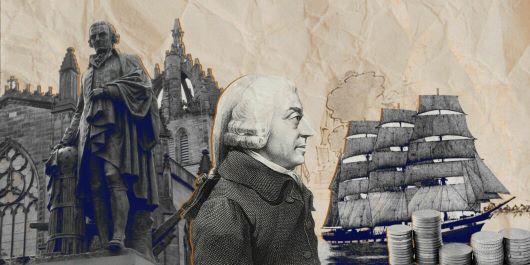 Vernon Smith, our own Smith, has called our attention to
Vernon Smith, our own Smith, has called our attention to 